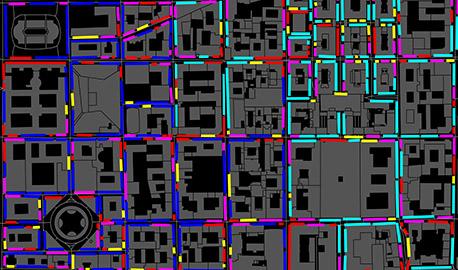How Should Cities Manage Access to the Curb?

Paris/Leipzig: The curb is an increasingly contested piece of urban real estate in many cities. The rise of ride services and the growth in urban goods delivery are challenging the ways cities manage curb space.
How should cities manage growing competition for access to the curb? A new study by the International Transport Forum (ITF) looks at the potential for a shift away from curb use focused on street parking.
The parking of private vehicles at the curb in dense urban cores is becoming a less and less tenable way of using that public resource. New approaches are needed to deal with an increasing diversity of curb uses that are emerging around the world.
Pick-up and drop-off zones
A more flexible allocation could include pick-up and drop-off zones for passengers and freight. Giving more room to ride services at the curb will initially have mixed impacts that cities need to manage. Over time, however, a greater diversity of transport choices should in most cases decrease pressure stemming from single car use, the study finds.
Drawing on computer modelling of alternative curb-use scenarios, the study finds that with actively managed curb space, ride service and public transport use may grow alongside each other and that pressure on traffic could decrease as the percentage of shared rides increases.
However, knowledge of the curb is generally poor. Cities lack metrics and data on curb use, which limits their ability to assess to which uses space should best be allocated where the curb is contested among different users.
Revenue impacts
“Many cities risk addressing these hotspots in a piecemeal fashion”, said Philippe Crist, mobility expert at the ITF and lead author of the study, during the launch at the 2018 Summit of transport ministers in Leipzig, Germany on 24 May. “The changes underway will require an increasingly strategic approach towards the allocation of public space in cities, on their streets and, ultimately, at the curb.”
Among other recommendations, the study encourages cities to:
- Rethink streets and their curbs as flexible, self-adjusting spaces.
- Manage curb space dynamically so it adapts to different uses and users.
- Establish effective tracking and monitoring of overall transport activity.
- Establish a system of street designations based on their primary purpose.
- Anticipate the revenue impacts of shifting curb use away from car parking.
Modelling work for the curb simulations was carried out by PTV AG, Germany, a member company of the ITF’s Corporate Partnership Board (CPB). The CPB initiated and supported four projects carried out by the ITF in 2017/18 (see below).
Free download of the report The Shared-use City: Managing the Curb at
https://www.itf-oecd.org/shared-use-city-managing-curb
More new CPB reports:
- Blockchain and Beyond: Encoding 21st Century Transport (May 2018)
- Defining, Measuring and Improving Air Connectivity (May 2018)
- (Un)certain Skies: Drones in the World of Tomorrow
(forthcoming – subscribe here to ITF publication alerts)
About the International Transport Forum
The International Transport Forum is an intergovernmental organisation with 59 member countries that organises global dialogue for better transport. It acts as a think tank for transport policy and hosts the Annual Summit of transport ministers. It is the only global body that covers all transport modes. The ITF is administratively integrated with the OECD, yet politically autonomous. More…
About the CORPORATE PARTNERSHIP BOARD
The Corporate Partnership Board (CPB) is the ITF’s latform for engaging with the private sector and enriching global transport policy discussion with a business perspective. The members of the ITF Corporate Partnership Board are: Abertis, AB InBev, Alstom, Aramco, Bosch, Brisa, ExxonMobil, Ford, Here, Incheon International Airport, Kapsch TrafficCom, Michelin, North Adriatic Sea Port Authority, NXP, PTV Group, RATP Group, The Renault-Nissan-Mitsubishi Alliance, SAS, Siemens, SNCF, Total, Toyota, Transdev, Uber, Valeo, Volvo Cars, Volvo Group and Waymo. More…


